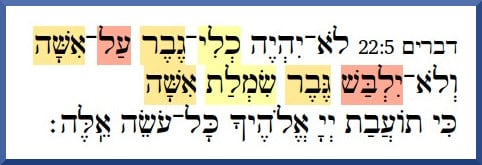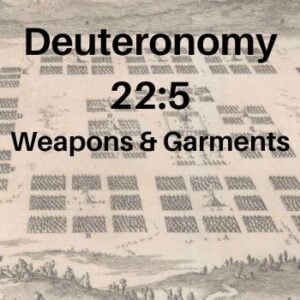Deuteronomy 22:5 is a verse about men and women and clothing that upsets a lot of people. Let’s try to understand what the verse does and doesn’t say.
Here’s my translation of the verse:
5. There shall not be a man’s article on a woman nor shall a man wear a woman’s garment, because all who do these are an abomination to the Lord your God.

I’ve tried to capture in my translation some of the odd features of the verse that are only obvious in the Hebrew.
3 Questions
Why isn’t the Hebrew in Deuteronomy 22:5 parallel? These phrases stick out:
- man’s article (kli gever) / woman’s garment (simlat isha)
- on a woman (al isha) / man wear (yilbash gever)
- man (gever) / woman (isha)
Why is the word gever used here? The common Hebrew word for man is ish, but does not appear in the verse.
The verse could have been written very simply: A woman (isha) shall not wear a man’s garment (simlat ish) and a man (ish) shall not wear a woman’s garment (simlat isha).
What does abomination (Hebrew: to’eiva) mean and why is it used here?
Let’s start by looking at 3 interpretations of Deuteronomy 22:5 in the Gemara.
Gemara – 3 Interpretations
We’ll start with a statement in the Gemara that raises another question about Deuteronomy 22:5.
Why does the verse say, “There shall not be a man’s article on a woman…”? If merely [to teach] that a man should not put on a woman’s garment, nor a woman a man’s garment, behold it says [of these acts] “these are an abomination” and there is no abomination here!
It must therefore mean that a man should not put on a woman’s garment and mix with women, nor a woman a man’s garment and mix with men.
We’ll call this Opinion #1. The rabbi speaking here points out that just putting on clothes (even of the opposite sex) cannot be the abomination.
Rather, the abomination is putting on garments that enable close contact between men and women that leads to abomination. Abomination (to’eiva), often, but not always, means forbidden sexual relations.
Immediately, the Gemara quotes another opinion that disagrees.
Rabbi Eliezer ben Yaakov says: How do we know that a woman should not go out with weapons to war? The verse says, “There shall not be a man’s article on a woman.” [The words] “nor shall a man wear a woman’s garment,” [signify] that a man is not to adorn himself with the cosmetics and ornaments of a woman.
According to Rabbi Eliezer ben Yaakov the key to understanding the verse is the nonparallel word structure I mentioned above.
He explains “man’s article” (kli gever) means weapons, but “woman’s garment” (simlat isha) means adornment.
Here’s the third interpretation in the Gemara:
Rabbi Hiyya bar Abba, citing Rabbi Yochanan, said: One who removes [the hair of] the armpits or the private parts is to be flogged because of [infringing the prohibition] “nor shall a man wear a woman’s garment.”
According to Rabbi Yochanan, a man violates this verse when he performs acts to beautify his body that are usually the customs of women.
Onkelos
Onkelos translated the Torah into Aramaic. His choice of Aramaic words serves as a commentary on each verse.
A man’s decorative weaponry shall not be on a woman, and a man shall not wear a woman’s ornaments, because all who do these (things) is disgusting before Hashem your God.
Onkelos limits this verse to accessories, not garments. He considers the weapon a man carries as an adornment. (See the Mishna Shabbat 6:4 for the sages debating if a weapon is an adornment for a man.)
It appears he would permit a woman to carry a concealed weapon, say for self defense. See also Torah Temimah later in this article.
Rambam – Idol Worship
In The Guide of the Perplexed 3:37, Rambam suggests a reason for the prohibition in Deuteronomy 22:5. He writes that part of the worship of Venus was “that a man should put on a woman’s dyed garment when standing before [the planet] Venus.”
In a similar way “a woman should put on a cuirass and arms when standing before Mars.” (A cuirass is armor that goes from the neck to the waist.)
It’s understandable that the Torah would prohibit acts of idol worship. As an extension, the act, even when not done for idol worship, is prohibited.
Vilna Gaon – The Adorned Garment
The Vilna Gaon explains that the words “simlat isha” indicate the outer garment that is made to be adorned. That is why Onkelos translates it as “a man shall not wear a woman’s ornaments” because it is the way of a woman to add ornaments and other fashion accessories to improve her appearance.
Rabbi Samson Raphael Hirsch
What follows here is a quote of Rabbi Hirsch on Deuteronomy 22:5. To make it easier to follow, I’ve added some paragraph breaks that are not in the original.
“Various interpretations of these prohibitions are given in Nazir 59a.
“According to one opinion, the Torah prohibits wearing clothing appropriate to the opposite sex only if it is done for immoral purposes.
“But according to the opinion of Rabbi Eliezer ben Yaakov, which is accepted as halacha, ‘There shall not be a man’s article on a woman’ means ‘a woman shall not go out bearing weapons of war,’ whereas ‘nor shall a man wear a woman’s garment’ means a man shall not adorn himself in an effeminate manner.
“According to this opinion, it is not the Torah’s intention here to prohibit disguising one’s gender by wearing clothing appropriate to the opposite sex. Rather, the Torah forbids each sex that which is specifically suited to the nature of the opposite sex. [Emphasis added.]
“A man shall not attend to his external physical appearance in the way appropriate to a woman’s nature, and a woman shall not appear in a vocation suited to a man’s nature (for it does not say ‘a woman should not go out bearing arms’ but ‘go to war bearing arms’).”
Malbim Explains
Malbim offers his explanation of the gemaras quoted above.
According to Opinion #1, “man’s article” (Hebrew: kli gever) is synonymous with “man’s garment.” Thus the prohibition is only if she is able to mingle with men.
But according to Rabbi Eliezer ben Yaakov these are not synonyms. Rather women are warned not to carry weapons.
He points out that there is a difference between the Hebrew words “ish” and “adam,” compared to “gever.” Any male human is an ish or adam. But the word gever implies a strong man, a master, or one who prevails.
“Simlat isha” (woman’s garment) implies important garments that are made to be adorned.
Rabbi Eliezer ben Yaakov rejects Rabbi Yochanan’s contention that the verse prohibits a man shaving his arm pits and private parts.
Malbim rejects the idea that this verse is dealing at all with a man grooming himself in the manner of women.
Torah Temimah – Who is a Gever?
Torah Temimah writes “gever” is a language of strength and might. It is the way of men to go to war, not women. It is the way of men to conquer, not women.
On the statement of Rabbi Eliezer ben Yaakov, Torah Temimah comments that a woman is not permitted to carry “a man’s article” when she is going out to war. He adds, this would include if she is going out due to some altercation with another person.
It seems to me he would agree that a woman carrying a weapon for self defense is be permitted.
Rabbi Eliezer ben Yaakov also said “that a man is not to use cosmetics as women do.” The Hebrew in the verse is “simlat isha.” The word simlat means a beautiful and pleasing looking garment. Therefore, this verse also means that a man should not wear colorful garments like what a woman wears nor ornaments or jewelry that are specific to a woman.
In practical terms, what is prohibited depends on the place and its customs.
Conclusion – Why To’eiva?
The Hebrew word to’eiva means something abominable, detestable, or repulsive. This word appears over 100 times in Tanach. It is used to describe various things or acts such as some sexual relations, idols, and non-kosher animals.
The word appears for the first time in Genesis 43:32. On that verse, Rabbi Hirsch explains the underlying idea is “a strong sense of pain” caused the presence of some object.
In our times it’s not popular to talk about differences between men and women. Even so, it is clear in the Torah that God created the sexes with different basic traits.
It seems that in Deuteronomy 22:5, the to’eiva that (as it were) causes God sharp pain (to echo R. Hirsch) is when men or women act contrary to their basic traits.
Further Reading
Deuteronomy 22:5 is one of many commandments found in Parshat Ki Teitzei.

